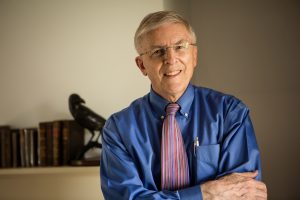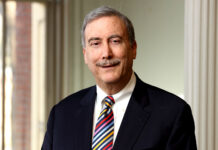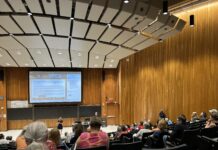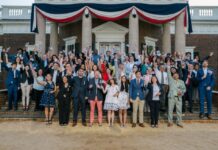
Kenneth G. Elzinga, a beloved senior member of the University faculty in the Department of Economics, is the namesake of a newly-endowed professorship that will be established in his honor. Elzinga, a fifty-one year teaching veteran on Grounds, says that the creation of this professorship is special to him but also a bit embarrassing.
“I’m very honored to have a chair named after me,” Elzinga says. However, he claims he was surprised to encounter one very unexpected assumption associated with the professorship.
“There are two people who thought I had died!”
Upon the announcement of the Kenneth G. Elzinga Professorship in Economics and the Law, many also figured Mr. Elzinga had stopped teaching.
“A number of people wrote me congratulating me on my retirement,” he says. “I’m definitely not retired, and I have no plans to retire. I am actively teaching with over 1,000 students.”
Elzinga hopes that those who come to hold the professorship will not only be interested in research but in also becoming gifted teachers.
“The advice I would give to the first occupant of the Kenneth Elzinga Professorship in Law and Economics is to not think about their career at the University as an either/or,” he says. “One of the great blessings for me when I joined the faculty was being influenced by a senior professor and tenured member of my department who encouraged me not to think about a dichotomy between either ‘You’re a good researcher’ or ‘You’re a good teacher,’ but to really try to pursue excellence in the classroom and contribute to the research mission of the University. That’s something I’ve really tried to have mark my career.”
He also hopes that the first occupant of the Elzinga chair will enjoy just being with UVa students, as Elzinga himself has taught well over 40,000 Hoos in five decades of his famed Principles of Microeconomics course.
Contrary to what budding undergraduate economists might think after sitting in his class, speaking in front of crowds posed a tremendous challenge for Elzinga when he first began at UVa.
“When I first started teaching here, I had never taught a Principles course,” Elzinga admits. “I had no background. The thought of teaching a big course was scary, and I would almost be sick to my stomach before I would go in. I’m basically a shy person by nature. I had done no public speaking, but students were patient with me, and I worked hard at it.”
He adds, “I don’t just stroll in now with a cocky, confident attitude… I think it’s appropriate that you never quite get confident about what you’re doing. There’s always a measure of ‘I need to really work at this.'”
And Elzinga is no stranger to hard work. He has been a consultant for organizations like the National Football League and has written for countless journals, including the American Economic Review, the Journal of Law & Economics, and the Harvard Law Review.
Throughout his prolific career, Elzinga says he has held one core belief – the same belief that originally prompted him to move to Charlottesville in the summer of 1967.
“I believe my calling, and I use that almost in a theological sense, is to be in the classroom, and doing research… [UVa] has been a place where I’ve been able to flourish,” he explains.
Elzinga attributes his teaching success largely to the academic freedom he enjoys at the University, where he has explored a wide array of interests including antitrust policy, religion and economics, and literary fiction.
“I’ve even been able to write mystery novels and my colleagues have been kind enough not to call me dilettantish… at least to my face,” he jokes.
While the identity of the prospective Kenneth G. Elzinga Professor of Economics and Law is unknown for now, Elzinga is certain that the honor’s first recipient will encounter a thriving Department of Economics filled with students who, like Elzinga himself, keep the material interesting.
Because to him, the topics and questions and concerns of the course and its students are, “to paraphrase an old gospel hymn, ‘new every morning.’”
















